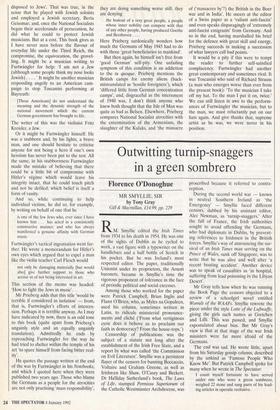Outwitting turnip-snaggers in a green sombrero
Florence O'Donoghue
MR SMYLLIE, SIR by Tony Gray Gill & Macmillan, .C14.99, pp. 229 R.M. Smyllie edited the Irish Times from 1934 to his death in 1954. He was one of the sights of Dublin as he cycled to work, a vast figure with a typewriter on the handlebars and a half bottle of Scotch in his pocket. But he was Ireland's most respected editor. The paper, traditionally Unionist under its proprietors, the Arnott baronets, became in Smyllie's time the vigorous proponent of tolerance in the face of periodic political and social excesses.
Among those who worked for the paper were Patrick Campbell, Brian Inglis and Flann O'Brien, who, as Myles na Gopaleen, used his column, sometimes written in Latin, to ridicule ministerial pronounce- ments and cliché (Prom what vertiginous eyrie does it behove us to proclaim our faith in democracy? From the house-tops.')
Censorship of publications was the subject of a statute not long after the establishment of the Irish Free State, and a report by what was called 'the Commission on Evil Literature'. Smyllie was a persistent flayer of the censors for banning Boccaccio, Voltaire and Graham Greene, as well as Irishmen like Shaw, O'Casey and Beckett. Dr Halliday Sutherland's book, The Laws of Life, stamped Permissu Superiorum of the Catholic Westminster Archdiocese, was
proscribed because it referred to contra- ception.
During the second world war — known in neutral Southern Ireland as 'the Emergency' — Smyllie faced different censors, dubbed by his assistant editor, Alec Newman, as `turnip-snaggers.' After the fall of France, the Irish authorities sought to avoid offending the Germans, who had diplomats in Dublin, by prevent- ing references to Irishmen in the British forces. Smyllie's way of announcing the sur- vival of an Irish Times man serving on the Prince of Wales, sunk off Singapore, was to write that he was alive and well after 'a recent boating accident'. Another device was to speak of casualties as 'in hospital, suffering from lead poisoning in the Libyan Desert'.
Mr Gray tells how when he was running the Book Page the censors objected to a review of a schoolgirl novel entitled Worrals of the WAAFs. Smyllie rewrote the piece under the style Lotte of the Luftwaffe, giving the girls such names as Gretchen and Lilli. This was passed, and Smyllie expostulated about bias. But Mr Gray's view is that at that stage of the war Irish ministers were far more afraid of the Germans.
The end was sad. He wrote little, apart from his Saturday gossip column, described by the unkind as 'Famous People Who Know Me'. But Patrick Campbell spoke for many when he wrote in The Spectator:
I count myself fortunate to have served under one who wore a green sombrero, weighed 22 stone and sang parts of his lead- ing articles in operatic recitative.










































 Previous page
Previous page